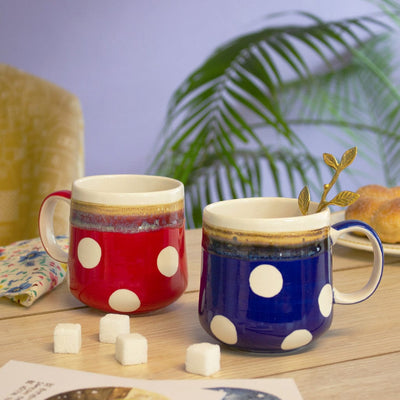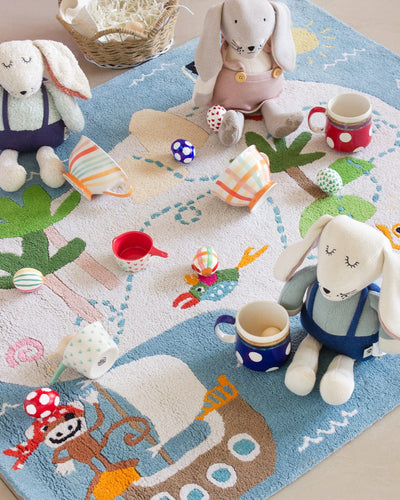The Delights of Distraction No.80: The Art of Embracing Uncertainty
Table of contents
This weekend, the both of us were set to leave for a week-long trip to Thailand. Our first international trip since February 2020, a hopeful reprieve from day-to-day Delhi-ness and an opportunity to meet and work with a collective of ceramicists in Chiang Mai who specialize in hand-painted products.
However, a routine, prescribed COVID test revealed that Ami had caught the dreaded virus. Our trip was canceled abruptly. In the first 10 minutes of this decision - a domino chain of worries were set off: How will we get a shipment of hand-painted ceramics in time for Diwali? How do we make up for the huge cost of non-refundable tickets and hotels? Do we have enough free cash flows to buy another trip for ourselves once Ami is better? What about long COVID effects?
The temptation, when we are worried, is to direct our minds to victimhood. Why me? Why after all the planning and effort to try and strip the unknown of its surprises do we have to contend with this unfair reality? We seek, as humans, to control the future. And yet, as entrepreneurs, it’s the first thing you learn to surrender to: uncertainty.
No matter all the arduous anticipation and rational planning, one of the first things you learn when you put something out into the world ( a business, a child, a pet, a work of art) is to confront this maddening yet, liberating thought: we can’t ever control what will happen to us and ours - nor should we try. Especially in the wake of the pandemic, we have learnt to submit a great part of our lives to the hands of the unknown, to the currents of time, the stars of destiny. Our plans, no matter how well-laid, cannot wrestle the future of its every last ambiguity. Life is subject to too many variables. Our mental telescopes only permit us to see so far, and we need to regularly muster up the humility to accept that immutable fact.
Thirty minutes after cancelling our trip, we decided to exchange the hubris of certainty for a welcoming of mystery. Let the dominoes topple where they may, we can call the airlines and hotels to postpone so we don’t lose the non-refundable booking, we can see this as an opportunity to recuperate and rest, we can make alternate contingencies for Diwali season, we can meditate on the gratitude of a test result in the comfort of one’s home versus quarantined at a hospital in a foreign country.
The Heian-era poet Izumi Shikibu wrote a tanka around the year 1000 - thirty-one Japanese syllables that almost invite uncertainty into the fray:
It is true,the wind blows terribly here- but moonlight
also leaks between the roof planks of this ruined house.
(The Ink Dark Moon, NY: Vintage Classics, 1990)
Shikibu's poem reminds us that beauty, and illumination (signaled by the image of moonlight), will come to us only if the full range of events and feelings are allowed into our lives. We may wall ourselves tightly to protect from wind and rain, from anger, grief and frustration. But it’s the gaps in the roof, (not the assigned doors, nor the windows) that are the unexpected openings through which the luminous arrives.
Ami is getting through with mouthfuls of cough syrup, sleep and herbal teas. The symptoms this time round are less severe, but hopefully they don’t extract a toll through Long Covid. But that niggling misgiving can be shelved for another time. For now, we bask in the grace of rest. And here is our programming for the week - some of our favourite links:
To read:
A touching article from the Guardian on the canine-shaped hole carved out of the writer’s heart after the painful loss of his dog. It’s a major design flaw that dogs only live 12-15 years, as they’re really the best of people. We don’t have a grief template for the loss of a dearly beloved pet, and anyone who says it’s ‘just a dog’ has never experienced the untold joy of being on the receiving end of the delighted, unconditional, no-strings-attached love of a furry friend. We hope this article helps one meet a pet’s loss with more empathy and compassion.
Lessons from a neuroscientist on what his terminal cancer prognosis has taught him about the mind. A summary:
- It is possible, even easy, to occupy two seemingly contradictory mental states at the same time. I’m simultaneously furious at my terminal cancer and deeply grateful for all that life has given me.
- This leads me to a second insight: The deep truth of being human is that there is no objective experience. Our brains are not built to measure the absolute value of anything. All that we perceive and feel is colored by expectation, comparison, and circumstance. Thirty minutes fly by in a conversation with a good friend, but seem interminable when waiting in line at the DMV. That fat raise you got at work seems nice until you learn that your co-worker got one twice as large as yours. A caress from your sweetheart during a loving, connected time feels warm and delightful, but the very same touch delivered during the middle of a heated argument feels annoying and presumptuous.
- Brains are organized to predict the near future, it presupposes that there will, in fact, be a near future. Nearly every religion has the concept of an afterlife (or reincarnation). Why are afterlife/reincarnation stories found all over the world? For the same reason we can’t truly imagine our own deaths: because our brains are built on the faulty premise that
there will always be that next moment to predict. We cannot help but imagine that our own consciousness endures. In this way, our brains are hardwired to prevent us from imagining the totality of death.
To watch: The hidden power of sad songs and rainy days (Susan Cain, TED)
People play sad songs on their playlist 4x more frequently than happy songs. They tell researchers that they associate sad music with beauty and wonder and transcendence, the so-called sublime emotions. We like rainy days and tragic drama and cherry blossoms, which we celebrate over flowers partly because they die young.
Philosophers call that the paradox of tragedy: Why do we sometimes welcome sorrow when the rest of the time we will do anything we can to avoid it? What we are craving, at bottom, is what C.S. Lewis called “the inconsolable longing for we know not what”, that joy that's laced with sorrow. Which is often triggered when we experience something so exquisite that it seems to come to us from another world. Our broken hearts connect us to each other and to that other world where the music comes from.
To self-care: This game guides you through a series of questions that help you practice self care. It's designed to take as much of the weight off of you as possible, so each decision is very easy and doesn't require much judgment.
To cook: In case you were on planet Mars or something, you’d have heard that Will Smith slapped Chris Rock in the face during the Academy Awards ceremony after the comedian made a joke about his wife, Jada Pinkett Smith.
We found that Italian slang has (at least) two foods that mean exactly the English word "slap"?
One is pizza. If you say that you're "giving somebody one pizza", an Italian will probably duck. The second one is schiaffoni, a pasta shape from Naples that can be translated as "strong slap". Here’s a recipe for a banging version of schiaffoni, though you can substitute it for any shape of pasta you have on hand:
To life hack: A tip for taming anger:
In some places customer service desks have a mirror mounted behind them so that customers can keep their cool when complaining. The idea was probably spawned from this quote by Thich Nhat Hanh from Taming the Tiger Within: Meditations on Transforming Difficult Emotions: “Whenever anger comes up, take out a mirror and look at yourself. When you are angry, you are not very beautiful, you are not presentable. Hundreds of muscles on your face become very tense. Your face looks like a bomb ready to explode.”
We don’t really pull out a mirror, but when you begin to feel your face get tense, you’ll find that immediately reminding yourself to relax your jaw and muscles helps to temper the hot emotions.
To quote: “Out of the millions of people we live among, most of whom we habitually ignore and are ignored by in turn, there are always a few that hold hostage our capacity for happiness, whom we could recognize by their smell alone and whom we would rather die than be without.” ― Alain de Botton, A Week at the Airport: A Heathrow Diary
To end: A poem that hark back to the essence of the article by the neuroscientist above, the ability to hold two contradictory ideas at once: The dual awareness of our improbable life and our inevitable death, is what allows us to infuse the interlude with love and beauty, with chances and adventure, with kindness and sweetness.
IMMORTALITY
by Lisel Mueller
In Sleeping Beauty’s castlethe clock strikes one hundred years
and the girl in the tower returns to the world.
So do the servants in the kitchen,
who don’t even rub their eyes.
The cook’s right hand, lifted
an exact century ago,
completes its downward arc
to the kitchen boy’s left ear;
the boy’s tensed vocal cords
finally let go
the trapped, enduring whimper,
and the fly, arrested mid-plunge
above the strawberry pie,
fulfills its abiding mission
and dives into the sweet, red glaze.
As a child I had a book
with a picture of that scene.
I was too young to notice
how fear persists, and how
the anger that causes fear persists,
that its trajectory can’t be changed
or broken, only interrupted.
My attention was on the fly;
that this slight body
with its transparent wings
and lifespan of one human day
still craved its particular share
of sweetness, a century later.
Have a wonderful week, infused with love and sweetness - but please be careful and mask up while you’re at it!
Viv and Ami







Leave a comment